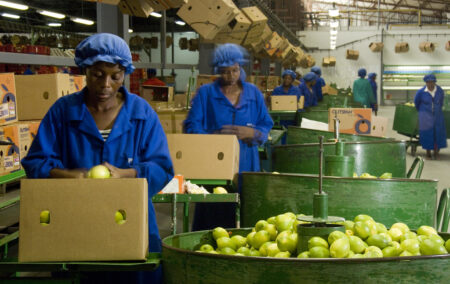‘What is to be done?’
Invoking Russian revolutionary Vladimir Lenin, this is a question frequently raised with an air of profundity in South Africa’s political commentary. It suggests deep consideration of weighty matters through an ideological lens, and setting history on a new trajectory.
It’s a phrase tailor-made for the present. The Covid-19 crisis has sent shockwaves through the world as little else has done in the past half-century. For South Africa, it comes on top of recession, itself following a decade of indifferent economic performance. It underlines the country’s extreme inequalities, and its failure to achieve the economic inclusion that would have made the lockdown manageable for millions of poorer people.
And this is likely to be felt most acutely in households’ ability to feed themselves.
Writing on this issue in City Press, EFF MP Sam Matiase poses Lenin’s question: ‘What is to be done?’
Abundant supply
Matiase reasonably enough distinguishes between food security at the macro and household levels. So, while South Africa produces an abundant supply of food, a lot of what it produces is exported, and millions of South Africans don’t get enough to eat – or at any rate, have insufficient nutritious food.
‘The solution,’ he concludes, ‘can come only from abolishing the dysfunctional and barbaric system of capitalism; dismantling the patterns of private land ownership and property through the expropriation and restoration of land to the people; empowering them to work the land, feed themselves, their families and their fellow humans in the spirit of brother and sisterhood.’
He is hardly alone in these observations, and making these demands.
The Covid-19 crisis compounds existing problems as much as it introduces new ones – and likewise, the solutions offered by Matiase would do little but magnify the circumstances that have contributed so much to the current impasse.
It remains an indictment on South Africa in the past three decades that this remains the lot of so many
Household food security depends on a combination of the production of foodstuffs, as well as their distribution and their accessibility to consumers. Widespread poverty, the inability to buy food, is an obvious barrier. It remains an indictment on South Africa in the past three decades that this remains the lot of so many.
Yet to suggest that expropriation (presumably without compensation), and dismantling private property in land is a workable answer is misguided in the extreme.
From an agricultural point of view, South Africa is in fact not a particularly well-endowed country. It has limited rainfall (over half the country receives less than 500mm a year, the level at which rain-fed farming is typically workable). Only around 3% to 4% of its land area is regarded as high-potential.
Besides, agriculture as a contributor to the economy has long been on the decline. It now accounts for less than 3% of GDP. The country’s population has been progressively shifting out of agrarian life in hopes of finding a future – work, education and the possibility of middle-class life – in the cities. This is an aspiration confirmed by a solid body of survey evidence. Indeed, government has admitted, to its frustration, that many restitution beneficiaries have little enthusiasm for making a life in farming, preferring monetary compensation.
Frontier of opportunity
This is common internationally. Urban life is the frontier of opportunity in growing economies around the world.
South Africa’s economic and developmental shortcomings – including household food insecurity – owe more to a failure to achieve high-growth, labour-absorbing urban economies than to its mishandling of land reform. Political mismanagement, a sometimes ideological hostility to the private sector, and chronic policy instability have taken their toll.
The agrarian economy, ‘the land’, offers neither a viable nor a sought-after resolution to South Africa’s problems.
None of this is to say that agriculture is unimportant. It is a bedrock industry. The Covid-19 lockdown and the looming disruption of global food supply chains have highlighted how important a domestic food industry is. Our productive commercial agricultural sector is a major strategic asset. Availability of food is a precondition for its accessibility.
all of this needs to be done with a clear eye on the realities of farming
Nor is there any suggestion that a well-considered land reform programme would not make a contribution to food security and overall development.
There is certainly a place for smallholder agriculture, and definitely for innovative forms of production – across Africa (indeed, across the world) the potential of urban cultivation in gardens and greenhouses is showing itself.
But all of this needs to be done with a clear eye on the realities of farming, and the very real challenges it presents and the limits it faces, as opposed to investing in a romantic picture of an agrarian idyll – one might even remark that some very audible supporters of rural lifestyles show little inclination for becoming farmers themselves.
Integral
Property rights are an integral part of farming. They encourage long-term planning and make investment possible, both of which are critical if farming is to be profitable (perhaps even possible) in the often inhospitable South African environment.
‘What is to be done?’
Food insecurity is a problem that cannot be resolved without successful economic growth and development; something that in South Africa will have an urban focus. Simultaneously, we should nurture our commercial farming economy, recognising its importance to our food supply, and seeking to expand it. New entrants are needed, be they large or small. So is dynamism and innovation.
Pragmatic capitalism, in other words – not romanticism nor the misdirected statism that burdens the economy – is South Africa’s best hope.
If you like what you have just read, subscribe to the Daily Friend

